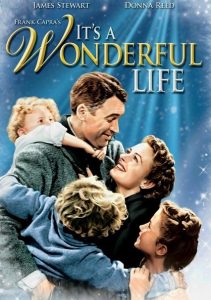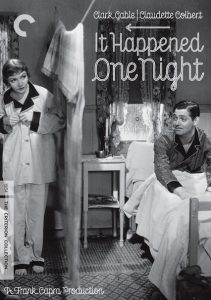It’s a Wonderful Life-1946
Director Frank Capra
Starring James Stewart, Donna Reed
Top 250 Films #219
Scott’s Review #863
Reviewed February 5, 2019
Grade: A-
A popular holiday tradition in many households eager to cozy up in front of the fire with an enduring and entertaining classic, It’s a Wonderful Life (1946) serves an essential purpose. It is the ultimate annual festivity passed down through generations.
While not one of my standards, I recognize the influence and the endearment the film offers and cannot fault its power to bring people together with its humanistic and sweet message.
James Stewart is perfectly cast as the wholesome and likable George Bailey. He strives to help all those in his small community who need help, often at the expense of his own well-being.
Depressed by the failure of his bank on Christmas Eve in 1945, in the snowy locale of Bedford Falls, New York, George is visited by a guardian angel named Clarence (Henry Travers), who teaches him what life will be like if he chooses the dire path of ending his own life.
Along with Stewart, Donna Reed as the wife, Mary Hatch Bailey, is cast exceptionally well and is the perfect counterpart to George.
Together, the actors immerse themselves in their roles, holding their heads high as the leaders of the sleepy little town they reside in, and set an example for the other townspeople with their kindness and thoughtfulness.
A sound “king and queen of the prom,” the duo radiates and elicits tears from audience members living vicariously through the couple.
A perfect companion piece to A Christmas Carol, perhaps the version from 1951, for similar periods, both spirited and teaching life lessons, is recommended.
Both are thematically similar in the visitation by a heavenly spirit and offering glimpses into the past, present, and future; the comparisons are endless, to say nothing of the Christmastime elements both possess.
Arguably, It’s a Wonderful Life is the most uplifting, both in good and bad ways. The lesson constantly voiced is that if one is good to others, one will be rewarded or at least have peace of mind.
This is not a bad lesson, which is the main reason for the film’s lasting appeal. Bad luck and financial hardship will inevitably affect everyone, but kindness is forever enduring.
It’s also worth mentioning the timing of the creation and release of It’s a Wonderful Life. As the United States, to say nothing of many European nations, struggled to pick up the pieces after the devastation of World War II, the picture was opportune to immerse itself in the lives of many people who needed a strong and uplifting message.
No wonder the film was popular when it was first released as the feel-good film of 1946.
The black-and-white cinematography does wonders to portray the film’s magical atmosphere. The high points are the cold and snowy bridge scenes.
Controversial years later was the colorization, and some would say the ruination, a decision that was met with anger by star Stewart, who went as far as testifying in court to voice his displeasure.
At the risk of being raked across the coals and deemed a “Scrooge”, portions of It’s a Wonderful Life are saccharin and manufactured in the utmost goodness, sometimes too good.
Admittedly, the characters of George, Mary, and their children come across as somewhat trite at times, as they seem to radiate only benevolent characteristics, never engaging in improper or impure actions. In a fantasy film, the overly humanistic approach can sometimes be a tad silly.
The same can be said for the angel, Clarence.
Nonetheless, films such as It’s a Wonderful Life (1946) serve their purpose in cinema history.
With a robust and heart-warming message, the positive vibes cannot be denied, and the warmth and emotion the film possesses radiate even the coldest hearts and the harshest of critics, willing to accept and be enraptured by the film’s staying power.
Oscar Nominations: Best Motion Picture, Best Director-Frank Capra, Best Actor-James Stewart, Best Sound Recording, Best Film Editing

